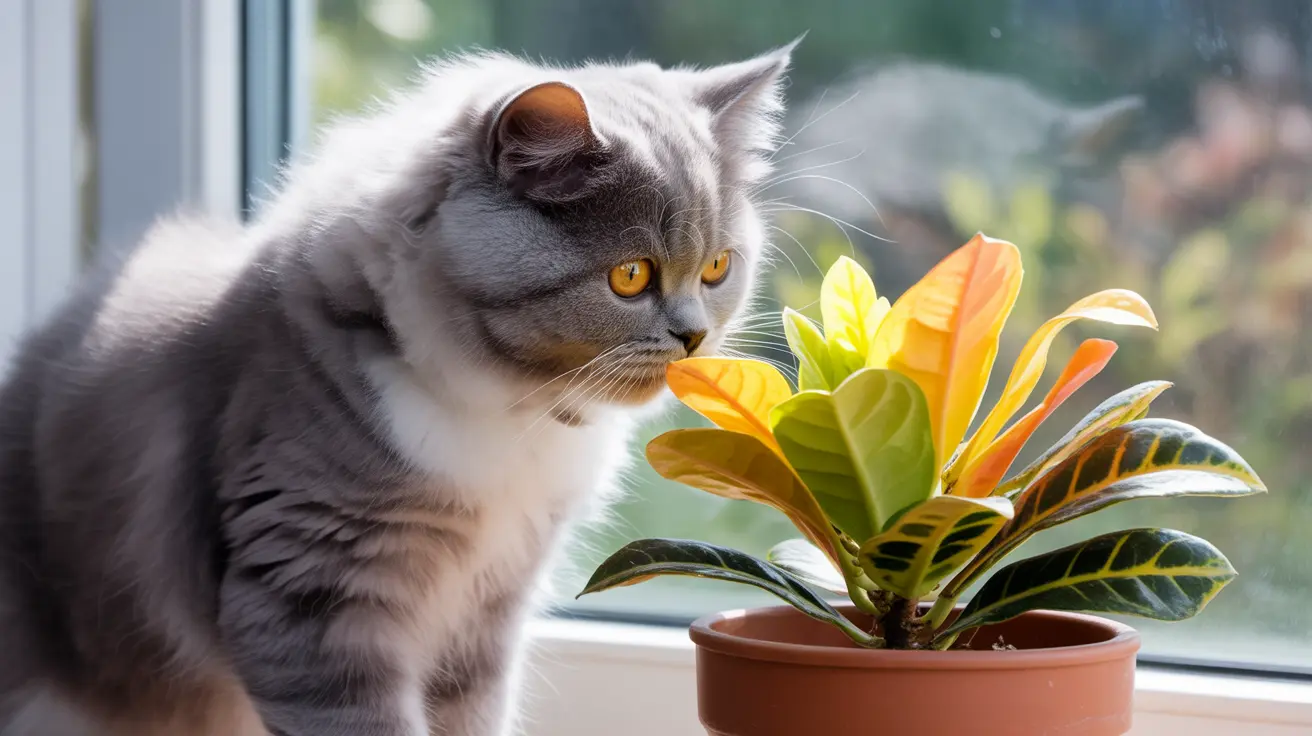Introduction
If you're a cat owner who loves decorating with houseplants, it's crucial to know that croton plants are poisonous to cats. These vibrant, ornamental plants, while beautiful with their multicolored foliage, contain toxic compounds that can cause serious health issues for your feline friend. From their leaves to their sap, every part of the croton plant poses potential dangers that cat owners need to understand.
In this comprehensive guide, we'll explore why croton plants are toxic to cats, the symptoms of poisoning to watch for, and what steps to take if your cat encounters these potentially dangerous plants. We'll also provide practical advice for creating a safer environment for your pets while still enjoying indoor greenery.
Understanding Croton Plant Toxicity
Croton plants (Codiaeum variegatum) contain several dangerous compounds, including phorbol esters and 5-deoxyingenol. These toxic substances are present in all parts of the plant, from its colorful leaves to its stems, roots, and even the milky sap. When cats come into contact with or ingest any part of the croton plant, these toxins can cause both immediate and delayed adverse reactions.
The plant's sap is particularly hazardous, as it contains irritating diterpenes that can cause problems even through skin contact. This makes croton plants doubly dangerous for cats, who might not only bite or chew the plant but also get the sap on their fur and subsequently lick it off during grooming.
Signs of Croton Plant Poisoning in Cats
Recognizing the symptoms of croton plant poisoning is essential for quick intervention. Common signs include:
- Excessive drooling or salivation
- Vomiting and diarrhea
- Oral irritation and swelling
- Abdominal pain
- Skin irritation or rashes
- Lethargy or depression
- Loss of appetite
- Difficulty swallowing
If you notice any of these symptoms and suspect your cat has come into contact with a croton plant, immediate veterinary attention is recommended.
Emergency Response and Treatment
If you discover your cat has been exposed to a croton plant, take these immediate steps:
- Remove your cat from the plant's vicinity
- Gently clean any visible plant material from their fur or mouth
- Contact your veterinarian or pet poison helpline
- Collect a sample of the plant for identification
- Monitor your cat's symptoms and vital signs
Don't attempt to induce vomiting unless specifically instructed by a veterinary professional, as this could cause additional harm.
Prevention and Safe Alternatives
The best way to protect your cat from croton plant poisoning is through prevention. Consider these safety measures:
- Remove all croton plants from your home and yard
- Research pet-safe alternatives like spider plants or Boston ferns
- Keep plants in rooms your cat cannot access
- Use hanging baskets or high shelves for necessary plants
- Create dedicated "cat gardens" with safe, cat-friendly plants
Frequently Asked Questions
Are all varieties of croton plants poisonous to cats?
Yes, all varieties of croton plants are toxic to cats. This includes popular varieties like Petra, Gold Dust, and Mammey crotons. Every part of the plant contains poisonous compounds that can harm your cat.
What symptoms should I watch for if my cat ingests or contacts croton plants?
Watch for signs such as excessive drooling, vomiting, diarrhea, oral irritation, skin rashes, lethargy, and difficulty swallowing. Any of these symptoms after plant exposure warrant immediate veterinary attention.
How should I safely handle croton plants to prevent poisoning in my cat?
If you must keep croton plants, wear gloves when handling them and keep them in completely cat-proof areas. However, the safest option is to remove them from your home entirely and choose pet-safe alternatives.
What immediate steps should I take if my cat eats or touches a croton plant?
Remove your cat from the plant area, clean any visible plant material from their mouth or fur, and contact your veterinarian immediately. Keep a sample of the plant for identification purposes.
Are there any safe alternative houseplants to grow if I have cats at home?
Yes, many pet-safe alternatives exist, including spider plants, Boston ferns, bamboo palms, and African violets. Always verify a plant's safety through resources like the ASPCA's toxic plant database before bringing it into your home.
Conclusion
While croton plants are beautiful additions to any indoor garden, their toxicity makes them unsuitable for homes with cats. The risks simply outweigh the aesthetic benefits. Instead, focus on creating a pet-safe environment with non-toxic alternatives that allow both you and your feline friend to enjoy the beauty of indoor plants without compromise.






